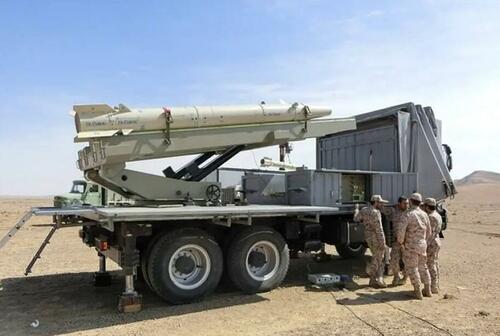NATO countries have been warning of swift and severe consequences in the wake of widespread reports that Iran is considering transferring sophisticated ballistic missiles to Russia for use in the Ukraine war.
A weekend Reuters story authored by multiple national security veteran reporters alleged that Russian personnel are already being trained to operate the Fath-360 close-range ballistic missile system. Several European intelligence sources were cited as the basis of the report, which Iranian leaders subsequently denied.

Biden's national security council has said this would mark a "dramatic escalation" in military cooperation between Tehran and Moscow, which has so far seen thousands of small Iranian drones transferred and utilized over Ukraine's skies.
Reuters details the following:
Citing multiple confidential intelligence sources, the officials said that Russian personnel have visited Iran to learn how to operate the Fath-360 defence system, which launches missiles with a maximum range of 120 km (75 miles) and a warhead of 150 kg. One of the sources said that that "the only next possible" step after training would be actual delivery of the missiles to Russia.
Moscow possesses an array of its own ballistic missiles, but the supply of Fath-360s could allow Russia to use more of its arsenal for targets beyond the front line, while employing Iranian warheads for closer-range targets, a military expert said.
An expected delivery date wasn't disclosed in the report, but it would be consistent with the trend of much closer cooperation on defense between the two 'pariah' nations which are highly sanctioned by the West.
At his point there's not much left to sanction, and so increasingly both Russian and Iranian leaders have demonstrated a "nothing to lose" attitude in terms of flaunting their defiance of Western warnings.
We also recently highlighted that Russia has appeared to step up supplies of air defense equipment to the Islamic Republic, at a moment Tehran is threatening massive retaliation attacks on Israel for the July 31 killing of Hamas leader Ismail Haniyeh in Tehran. The expectation in such a scenario is that Israel's counter-response would be bigger.
Allegations further say Russia has already received many Iranian ballistic missiles...
⚡️BREAKING
— Iran Observer (@IranObserver0) February 21, 2024
Iran has supplied Russia with a large number of powerful precision ballistic missiles.
According to Reuters, Iran has sent 400 missiles, many of which belong to the Fateh-110 family of short-range ballistic weapons, as well as Zolfaghar missiles.
These missiles… pic.twitter.com/wnhoSDuypO
The Iranians are reportedly also pressuring Moscow to fulfill delivery of Su-35S fighter jet fighters which were previously pledged in a defense deal, given the regional temperature is heating up fast.
Moscow likely feels obliged given the significant Iranian drone transfers it has received throughout the course of the Ukraine war. Iran has heavily aided Russian forces, and now Russia is quickly coming to Iran's assistance.
NATO countries have been warning of swift and severe consequences in the wake of widespread reports that Iran is considering transferring sophisticated ballistic missiles to Russia for use in the Ukraine war.
A weekend Reuters story authored by multiple national security veteran reporters alleged that Russian personnel are already being trained to operate the Fath-360 close-range ballistic missile system. Several European intelligence sources were cited as the basis of the report, which Iranian leaders subsequently denied.

Biden's national security council has said this would mark a "dramatic escalation" in military cooperation between Tehran and Moscow, which has so far seen thousands of small Iranian drones transferred and utilized over Ukraine's skies.
Reuters details the following:
Citing multiple confidential intelligence sources, the officials said that Russian personnel have visited Iran to learn how to operate the Fath-360 defence system, which launches missiles with a maximum range of 120 km (75 miles) and a warhead of 150 kg. One of the sources said that that "the only next possible" step after training would be actual delivery of the missiles to Russia.
Moscow possesses an array of its own ballistic missiles, but the supply of Fath-360s could allow Russia to use more of its arsenal for targets beyond the front line, while employing Iranian warheads for closer-range targets, a military expert said.
An expected delivery date wasn't disclosed in the report, but it would be consistent with the trend of much closer cooperation on defense between the two 'pariah' nations which are highly sanctioned by the West.
At his point there's not much left to sanction, and so increasingly both Russian and Iranian leaders have demonstrated a "nothing to lose" attitude in terms of flaunting their defiance of Western warnings.
We also recently highlighted that Russia has appeared to step up supplies of air defense equipment to the Islamic Republic, at a moment Tehran is threatening massive retaliation attacks on Israel for the July 31 killing of Hamas leader Ismail Haniyeh in Tehran. The expectation in such a scenario is that Israel's counter-response would be bigger.
Allegations further say Russia has already received many Iranian ballistic missiles...
⚡️BREAKING
— Iran Observer (@IranObserver0) February 21, 2024
Iran has supplied Russia with a large number of powerful precision ballistic missiles.
According to Reuters, Iran has sent 400 missiles, many of which belong to the Fateh-110 family of short-range ballistic weapons, as well as Zolfaghar missiles.
These missiles… pic.twitter.com/wnhoSDuypO
The Iranians are reportedly also pressuring Moscow to fulfill delivery of Su-35S fighter jet fighters which were previously pledged in a defense deal, given the regional temperature is heating up fast.
Moscow likely feels obliged given the significant Iranian drone transfers it has received throughout the course of the Ukraine war. Iran has heavily aided Russian forces, and now Russia is quickly coming to Iran's assistance.
